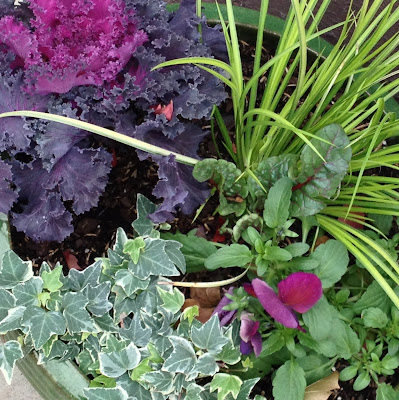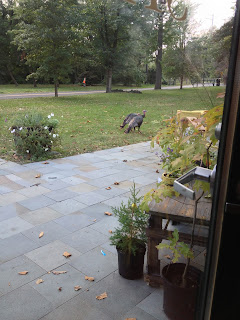Seeds and Spores
tales of things that grow
Tuesday, December 18, 2012
Sunday, November 4, 2012
Cold Weather Planters
 Having flowers on your stoop is necessary all year round, and in my opinion, ornamental cabbage and kale make excellent choices. There are many different kinds, and they pair well with evergreen grasses and winter pansies. Ivy adds a nice touch trailing over the edge.
Having flowers on your stoop is necessary all year round, and in my opinion, ornamental cabbage and kale make excellent choices. There are many different kinds, and they pair well with evergreen grasses and winter pansies. Ivy adds a nice touch trailing over the edge.
Pictured here is an ornamental cabbage, variegated ivy 'Glacier', winter pansies, and an ornamental grass Acornus* 'Ogon'.
 *Acorus is a neutral grass. Evergreen or neutral grasses are usually plants that look like grasses but aren't actually classified as grasses, they are generally called grass-like plants. Divide evergreen or neutral grasses and grass-like plants in spring only. Evergreen grasses don't ever go dormant. Dividing plants wounds them to some degree. For evergreen grasses this wounding will really affect their ability to live through the winter.
*Acorus is a neutral grass. Evergreen or neutral grasses are usually plants that look like grasses but aren't actually classified as grasses, they are generally called grass-like plants. Divide evergreen or neutral grasses and grass-like plants in spring only. Evergreen grasses don't ever go dormant. Dividing plants wounds them to some degree. For evergreen grasses this wounding will really affect their ability to live through the winter.Pictured here is an ornamental purple kale, Acornus 'Ogon' grass, pansies, and ivy. I threw a little Swiss Chard in this one hoping it makes it through some of the winter.
Monday, October 29, 2012
Gobble Gobble
The other day I was at Bartram's Garden staring out the window and two wild turkeys came up to the window. They were poking their beaks around at the plants pictured below. Their large size and beautiful black and white feathers were truly a sight to see on a lazy Sunday afternoon!
Tuesday, September 11, 2012
Reap What You Have Sown
| |
|
Buttercup Squash, Fennel, Calendula, Victoria Blue Salvia, Nasturtium, Tomatoes |
 | |
| Nasturtium (EDIBLE!!) Flowers, Tomato Plant 'Black Prince', Calendula in far back |
.JPG) |
Nasturium Flowers and Leaves, Plum Tomato 'San Marzano', Okra, Cherry Tomatoes, Tomatillos, Heirloom Tomatoes 'Ananas Noire, Heirloom Tomatoes 'Black Prince', Pablano Peppers, Yellow Squash |
 |
| Buttercup Squash |
Tuesday, July 24, 2012
A Fruitful Harvest
"Space Station" buttercup winter squash, "Giant Marconi" bell peppers, jalapeno and serrano chili peppers, yellow summer sqaush, Fennel bulbs, and one small Sweet 'n Heat pepper all on a bed of "Toscano" kale
Tuesday, July 10, 2012
Friday, June 22, 2012
City Garden in June 2012
 |
| Tropical Hibiscus |
 |
| Black Mission Fig tree in foreground |
 |
| First Flowering of Hyacinth Bean Vine |
 |
| Calendula- lady bugs love it! |
 |
| Clockwise L to R......Pink Monarda (Bee Balm), Pink Sonata Cosmos (Lady bugs Love it!), Victoria Blue Salvia, Yellow Calendula, Cilantro, Chives, Arugala, more Victoria Blue Salvia |
Vertical Lettuce Display
 |
| Vertical lettuce display for the Garden Terrace at the Belmont Stakes Horse race |
We didn't have enough time to make an actual living planted wall, so instead we inserted heads of lettuce to mimic what it would look like fully planted.
The boxes can be planted with seeds or starts and grown in horizontally until the roots are established.
Friday, June 1, 2012
Tomato Trellises
 |
| From Left to Right.....Rosemary and Garlic in the foreground, "Black Prince" Tomato, Cosmos, Achillea, "Moscovich" Tomato, and Fennel (the cage is so the squirrels don't dig it up) |
 |
| Achillea and Determinate tomato variety "Moskovich" |
 |
Here are some options for ties....
Thursday, May 10, 2012
Friday, May 4, 2012
Is it time to plant Tomatoes yet?
These seedlings are hungry to get into the ground, and you are excited to put them there, but is it time to plant them outside? The most important thing to watch is the low nighttime temperatures. Frost data tables for the Philadelphia region suggest that we can still get temperatures low enough to harm or kill tomato seedlings, even into May. Fruiting plants in the Solanaceae family (tomatoes, eggplant, and peppers) really don't like to be subjected to temps below 50 degrees. Wide temperature fluctuations when plants are still seedlings causes stress to the plant which usually results in a slower growth rate.
Whether you decide to plant a little early or after the projected frost free date of May 15th, there is a process by which you should toughen a plant up to withstand low nighttime drops, called "hardening off." This simply involves putting your plants outside while they are still seedlings in the sprouting container like the ones pictured above. At first, put the plants out for a few hours each day increasing the amount of time they are outside each successive day and after a few days they will be ready to be left out overnight. Even the relatively small changes in temperature experienced this way should help to toughen up then new plants. As long as the temperature stays above 55 at night its fine leave them out by their lonesome with no cover. Once they are in the ground, they can still be protected from cooler temps (below 50) by covering them with a thin plastic tarp, paper bag, or upside down bucket. Happy planting!
Whether you decide to plant a little early or after the projected frost free date of May 15th, there is a process by which you should toughen a plant up to withstand low nighttime drops, called "hardening off." This simply involves putting your plants outside while they are still seedlings in the sprouting container like the ones pictured above. At first, put the plants out for a few hours each day increasing the amount of time they are outside each successive day and after a few days they will be ready to be left out overnight. Even the relatively small changes in temperature experienced this way should help to toughen up then new plants. As long as the temperature stays above 55 at night its fine leave them out by their lonesome with no cover. Once they are in the ground, they can still be protected from cooler temps (below 50) by covering them with a thin plastic tarp, paper bag, or upside down bucket. Happy planting!
Wednesday, April 4, 2012
Freshly Tilled!
With all this nice weather I decided to expand my garden plot. It is now a whopping 17ft by 13ft.
This should be enough room to grow a decent crop without over crowding. Next step... an indestructible deer and rabbit fence! Then after that....lots of compost!!
This should be enough room to grow a decent crop without over crowding. Next step... an indestructible deer and rabbit fence! Then after that....lots of compost!!
Subscribe to:
Comments (Atom)
.jpg)
.jpg)












.jpg)
.jpg)
